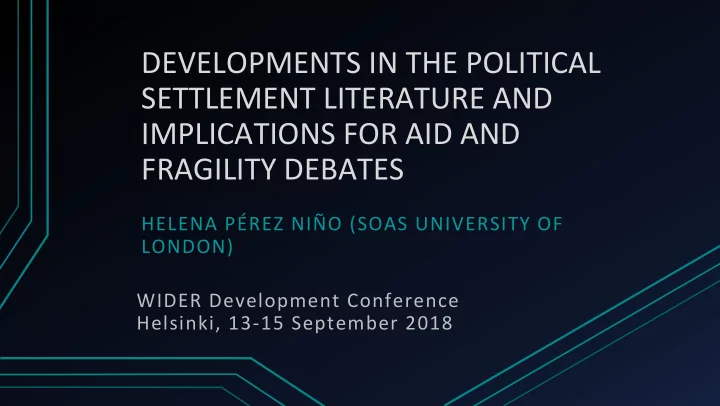

DEVELOPMENTS IN THE POLITICAL SETTLEMENT LITERATURE AND IMPLICATIONS FOR AID AND FRAGILITY DEBATES HELENA PÉREZ NIÑO (SOAS UNIVERSITY OF LONDON) WIDER Development Conference Helsinki, 13-15 September 2018
Mozambique and Angola: original project • Interrogate existing narratives (Mozambique - aid-driven success; Angola - resource curse) • Different rents (aid, resources) and their effects of institution building • The two countries shared commonalities but had important differences • How the two countries diverged and what was the role of aid in this divergence?
POLITICAL SETTLEMENT FRAMEWORK (Khan 2010, 2018) “The way institutions work in practice depends on the responses of the organizations operating under these institutions. The relative power and capabilities of organizations are therefore important determinants of how institutions work. The distribution of organizational power is defined as the political settlement.” Institutions and policies — > rents — > resource allocation — > inter-group competition
PSF and implications for Aid and Fragility debates • Domestic power balances are more than the context for more effective programming and delivery • Shifting the focus to the interaction between Aid and the distribution of organisational power • How are groups’ interests and incentives affected by Aid; how is power mobilised to support and resist implementation • Alignment between Aid and the political economy of structural transformation • How aid interacts with other rents in sustaining the political settlement • Endogenising donors as organisations within the political settlement
• Focus on the (mis)alignment • Angola and Mozambique: between institutions and • Diverse fiscal structures power balances through war and • PSF Three dimensions reconstruction • Vertical distribution of power • Different role and timing of rents in the consolidation of • Horizontal distribution of the political settlement power • Angola: authoritarian and • Material foundations of the centralised ruling coalition Political settlement • Mozambique: fragmented ruling coalition
• Behuria, P., Buur, L., & Gray, H. (2017). Studying political settlements in Africa. African Affairs, 116(464), 508-525. • Di John, J., & Putzel, J. (2009). Political settlements: Issues paper. CSRI. • Gray, H., & Khan, M. (2010). 18 Good governance and growth in Africa. The Political Economy of Africa, 339. • Kellsal, T. (2018). Towards a universal political settlement concept: A response to Mushtaq khan. African Affairs. • Mushtaq Husain Khan, ‘Political settlements and the governance of growth - enhancing institutions’ (Research Paper Series on Governance for Growth, SOAS, University of London, London, 2010) • Khan, M. H. (2018). Power, pacts and political settlements: A reply to Tim Kelsall. African Affairs. • Pérez Niño, H., & Le Billon, P. (2013). Foreign aid, resource rents and institution-building in Mozambique and Angola. WIDER Working Paper No. 2013/102. • Pérez Niño, Helena, and Philippe Le Billon. "Foreign aid, resource rents, and state fragility in Mozambique and Angola." The ANNALS of the American Academy of Political and Social Science 656, no. 1 (2014): 79- 96. • Perez-Nino, Helena and Le Billon, Philippe (2016) 'Foreign aid and political settlements: contrasting the Mozambican and Angolan cases.' In: Hagmann, T. and Reyntjens, F., (eds.), Aid and Authoritarianism in Africa: Development Without Democracy. London: Zed Books.
Recommend
More recommend